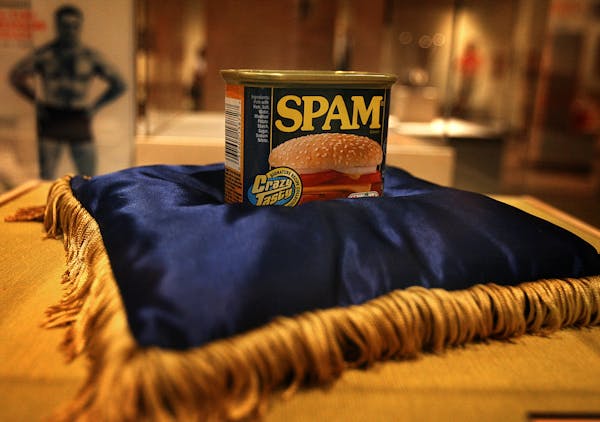Chef and local celebrity Ann Kim opened her newest Twin Cities restaurant just two weeks ago, but the menu has already changed.
In name, at least.
At Kim's, a Korean-American restaurant in Uptown Minneapolis, she served her version of house-made Spam in two dishes: kimchi fried rice and a Spam 'n' cheese "sammie."
This, of course, was an ode to the salty, processed, canned pork from Austin, Minn.-based Hormel Foods, which introduced the product in 1937 before it gained popularity as a cheap and shelf-stable protein during World War II.
Trademark law, however, doesn't consider imitation the highest form of flattery.
"We did not get an official cease and desist letter. It was an inquiry email asking if we were using the official Spam product," Rachael Crew, a spokeswoman with Kim's Vestalia Hospitality group, said in a statement. "Based on Hormel's email, we knew it would come next. So we proactively changed the ingredient name to Ann's Ham."
The online and printed menus now reflect the change, including the renaming of the sandwich to "Ann's ham 'n' cheese." Kim did not respond to requests for comment.
Hormel declined to comment on this specific incident but did say in a statement that "as a Fortune 500 global branded food company" it has "brands that are beloved across the world."
Thus, this is not an unfamiliar occurrence for the Minnesota meatpacker.
"From time to time, we come across instances of others using our trademarks without licensing agreements. We understand that people are inspired by our iconic products and may even create replicas, usually unaware of any trademark violation that may have occurred," the statement read. "Typically, we try to give people the benefit of the doubt and simply ask if they are aware of our trademarks and what our process is for the use of our trademarks.
"The issue is, if trademark owners don't police their trademarks, they may lose them. So, we do this in order to prevent that from happening and work with [the] business to try and remedy the situation without too much hassle."
Hormel has allowed the use of its brand names before, most famously for the Broadway musical "Spamalot," based on the "Monty Python and the Holy Grail" film. A revival of the show recently opened on Broadway, and Hormel created a limited-edition flavor and collector's-edition can for it.
Brian Olson, corporate communications manager at Hormel, told Business Insider in 2020 how the company had previously focused on "protecting the brand from similar competitive products," even suing the Muppets' creator's production company in the 1990s for creating a wild-boar puppet character named Spa'am in the "Muppet Treasure Island" movie.
"Spamalot is a great example of where Hormel Foods stopped being as concerned with product protection," Olson said, per Business Insider, "and fully embraced the deep cultural impact that had transcended the product itself."
Spam has gained particular popularity in Asian cuisine, perhaps most famously in the Hawaiian dish Spam musubi, which is seasoned and fried Spam on rice wrapped in seaweed. During the Korean War, it became a staple ingredient in South Korea, a then-poor country, especially in dishes like the stew budae-jjigae.
Kim immigrated to Apple Valley from South Korea with her family when she was a toddler in the 1970s. She eventually became a James Beard Award-winning chef featured on the Netflix series "Chef's Table: Pizza," which highlighted her restaurants Pizzeria Lola, Hello Pizza and Young Joni. She previously had Mexican-inspired restaurant Sooki & Mimi, which she closed this past October to turn into Kim's.

How Minnesota businesses can spot and prevent invoice fraud
No place for cryptocurrency in retirement portfolios

Minnesota Department of Health rescinds health worker layoffs

Eco-friendly house on 30 acres near Marine on St. Croix listed at $1.6M

